#the way harrison becomes lonan in bb SO the way lonan could become harrison in his novella.............
Text
ok hear me out... in BODY BACK we get harrison's time alone in las vegas--SO, does that mean rachel writes a lonan novella spanning the time HE spent alone in las vegas
#someone is going to need to talk me out of this before i find a title#hallowed... bodies...???#yes officer it's her right here the woman who won't stop brainstorming wips that have nothing to do with the one she's#SUPPOSED TO BE WRITING RIGHT NOW#but what if i... mirrored the entirety of BB in loser's pov#what if what if what IF#the thematic parallels......#the way harrison becomes lonan in bb SO the way lonan could become harrison in his novella.............#IF I TITLE IT HALLOWED BODIES WE GET THE BODY PARALLEL oh boy what have i done
34 notes
·
View notes
Text
Holy Ground | Hallowed Bodies Update #1
LONAN CLARK ERA LONAN CLARK ERA!! Welcome to instalment 1 of the Hallowed Bodies updates! :) HB is a literary fiction novella I finished in August (WIP intro) and a companion to BODY BACK.
Let's talk about magical beginnings, how life impacts writing, grieving potentials, & Lonan's internality!
Update under the cut!
Logline: When his girlfriend leaves to travel, Lonan carries out his typical daily routine which includes visiting a church and walking a strange route home.
Hallowed Bodies taglist (pls ask to be +/-):
@subtlefires @dallonwrites @saintedseraph @cream-and-tea @rownanisntwriting @euphoniouspandemonium @iwannawritepls @thefruitonyourfly @olive-riggzey @silassghost @thelivingdeceased

Beginnings & more beginnings
When I got the original idea for Hallowed Bodies, it was March and I was on the other side of the country at the intersection in front of my old apartment building. It was raining on my walk home from a journalism class and I was listening to My Dying Spirit by Greyson Chance when I had the thought... "okay if Harrison is alone in Las Vegas in BODY BACK, that must mean LONAN is also alone for a while in Las Vegas--so what's he doing?"

For about two days, I was really consumed with the idea of what this book *could* be--eerie church imagery, a contemplation of faith, an exploration of Lonan's relationship with his dead mother. Then time passed, I moved, life got weird, I finished BODY BACK, and by the time I got back to HB, something in me had changed.
When life changes writing & grieving potentials
I've given that preamble because HB didn't turn into the thing I thought it would turn into on that initial walk back home. I think there's sometimes a tendency in writing advice spaces to be so blasé about how life circumstances impact writing. I don't think there was any possible way June 2023 me could've written the Hallowed Bodies I'd dreamt up back in March 2023. I changed SO much despite staying fundamentally the same and the idea also had to change because *I'm* the one writing it.
With that said, sometimes I wonder what would've happened if I stayed exactly where I was in the spring (which is an extremely Lonan and Harrison-core thing to consider LOL). In a way, a big part of writing this book was grieving what it could've been. I still have a distinct vibe of the early vision which is very similar but adjacent nonetheless to what I actually wrote. I think that's what made writing this project so hard because I didn't understand what I wanted from it--March me was conflicting with June me and in the end, what we got was a mixture of both!
A positive start... for now!!!
I've always heard of writers talk about "shiny new idea syndrome" but I never really understood it. However, drafting Holy Ground completely clarified what shiny new idea syndrome even is which left me feeling perhaps overly confident (honestly which I'm grateful for because I didn't feel that way again until the last chapter LOLLL).
I drafted the first paragraph of this book back in April, and the rest of it only took a day or two in June. It's very short (for me) at 1500 words and illuminated two structural elements for HB: short chapters and "vignette"-like scenes.
Inspiration & vibes:
Okay so SORRY if you already know this but Greyson Chance got me unwise & his music video for My Dying Spirit is MY FAVOURITE THING IN THE WHOLE WORLD. I always thought of MDS as a really solid Lonan song, but the music video's Catholic imagery had me spiraling MORE. I basically wanted to recreate the vibes of that video in the form of a book.
We were really going for THIS as the vibe (from the video)!


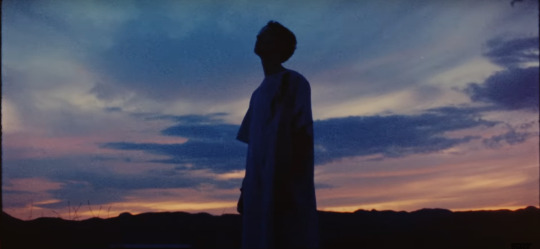
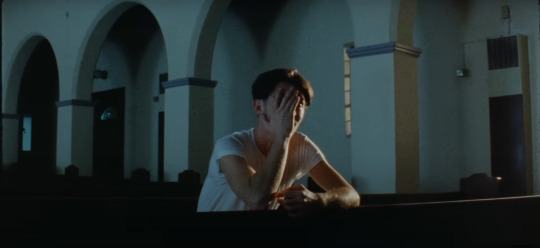
Hallowed Bodies as Antithesis
One of the first things I knew about HB was that I wanted it to be a mirror of BODY BACK. I wanted to see how Lonan got to be a better person BEFORE FH in contrast to how Harrison becomes a worse person before FH. Thinking of Hallowed Bodies as the antithesis of BB is really fascinating to me! If BB is loud, HB is quiet. If BB is maximalist, HB is minimalist (as much as I could help it haha).
Internal narratives as a trap
Something I LOVE about this project in general is that it's SO internal. I don't think I've ever been so deeply rooted in Lonan's voice before, but Hallowed Bodies as a project warrants intimacy. Lonan's alone for a week in Las Vegas basically doing nothing, which is a precursor to Feeding Habits (the novel that comes after this) where he's really "settled" into being a completely subordinate person in his own life.
I wanted to use internality as a means to make the narrative feel confined, like Lonan does. Because of that, I focused on adding a LOT of descriptions that directly reflect Lonan's desires and internal conflicts (the excerpt with the couple reflects this the most). What he notices is EXTREMELY important. What do his observations reveal about him?
Listlessness and Lonan
Something that became clear to me early in the drafting process is that Lonan is soooo listless. Like direction? Drive? Passion? He has NOTHINGGGG. He's really living a settled, "domestic" life, and he clearly can't handle it. This is setup for Feeding Habits so it's not as intense as it is there, but this man is BORED and ready to romanticize ANYTHING for some serotonin. This is critical setup for later when we meet "the man" (whose name for efficiency's sake is Dallas bc he looks like Matt Dillon in The Outsiders <3 that was the reason <3).
HB is a really transitional project for Lonan. He comes off Moth Work a better person to others but not quite a better person to himself. We get to see him crave gentleness a LOT in HB, a feeling that seems so foreign to him, which I think also contributes to his feeling of displacement. In a way, it was also transitional for me--it's the first thing I've written in full as a graduate!
The plot
CW: religious trauma (Catholicism)
Scene A:
In a church, Lonan recalls a memory of him and his father praying.
Scene B:
Lonan starts his walk home, aware the route is nonsensical.
Scene C:
Lonan recalls the last time he saw Eliza before she left for her week-long trip.
Scene D:
Lonan considers Las Vegas' warm autumn.
Scene E:
In memory, Eliza finds Lonan's father's rosary in her apartment.
Excerpts:
The first "scene" (aka vignette). This is one of my favourite openings EVER!!! It's just Hallowed Bodies core!
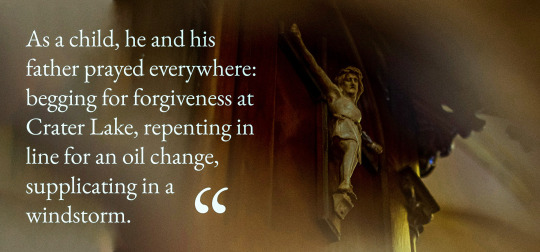
Lonan doesn’t pray anymore. At least not the way he used to. As a child, he and his father prayed everywhere: begging for forgiveness at Crater Lake, repenting in line for an oil change, supplicating in a windstorm. On Sundays, they’d wake before dawn and nestle in front of the bathroom mirror, recite the first chapter of Genesis, Paul’s letters to Timothy, Psalm 22. Lonan preferred the Apostle’s Creed. He’d watch his young mouth repeat I believe in Jesus Christ, his only Son, our Lord, I believe in Jesus Christ, his only Son, our Lord, I believe in Jesus Christ, his only Son, our Lord, and he did believe. After hours of this, sunlight misting the open window, mass a half hour away, their lips would be so numb they’d have to pinch them until they were bloody mouthed and ready, at last, for God.
The truth is, Lonan believes in nothing now. He’s as fatherless as he is motherless as he is godless. This should be a good thing. But bowed against a pew, the church around him hollow like Jesus’ empty tomb, his eyes trained on the dangling crucifix ahead of him, he’s certain this is wrong. He needs a mentor, a shepherd, an idol. He needs someone to follow.
This is the second scene/vignette. Something I love here is that we can tell Lonan's a hopeless romantic lol. Like hey you're looking awfully fondly at that couple, why?? You want that?? You want love?? Also! If you read the recent Changing States excerpt, you'll notice I also mention a café in the arts district which is an easter egg to say Lonan and Jeremiah love the same café (they need to be friends):
He takes the long way home. The long way home entails cutting past a wedding chapel near Lewis until he nears a second wedding chapel by a dollar store. He then turns around and retraces his steps back to the church, then walks all the way to a café bakery in the arts district where he stands and watches patrons from across the street. A man always meets a woman. They swipe off milk foam mustaches, lean against each other to fill out a crossword. The sun sometimes hits their faces and pales their eyes till they’re transparent like vapour. They never walk out together. He leaves the moment the first one goes, then continues back to the church where he finally walks ten minutes to Eliza’s place. The walk takes over an hour. It’s inefficient. Nonsensical. He makes this route every day.
This is just such a typical Lonan and Eliza interaction:
She’d left groceries in the fridge—no need to go shopping—and if he wanted, she’d also left a fifty-dollar bill on the counter for takeout. As he stared at the ceiling, she kissed him and complained about her mother’s plans to go horseback riding that coming weekend. “I know what a horse looks like,” she said, then explained they’d also be touring Stowe with a gaudy tourism agency. “She’s exhausting me already.” She sighed, having gone completely still. Lonan didn’t notice until she took his face with her hand, squishing his jaw, and asked “Are you okay?”
An hour later, she was gone with a pre-packed suitcase, and he was still lying in bed wondering if she’d been there at all, if he’d been there at all, if in actuality they were both dead, or at the very least, both ghosts.
Do you fear bodies of water to the point where you practice holding your breath in full sinks so if you're ever close to drowning at least you're prepared:

It’s September in Las Vegas. The asters that grow outside Eliza’s apartment building have started to bloom, shockingly purple. The severe summer heat has barely faded, weather Lonan isn’t used to. Sometimes he crouches right in front of Eliza’s oscillating fan so it blows right in his face. At other times he ruffles up the freezer until he finds something suitable to drape on his forehead—a bag of peas, a Ziploc of homemade perogies, a hard plastic ice pack Eliza almost always forgets to return after work. Though sometimes, he cranks the bathroom sink all the way to cold and fills it up, sticks his face in there like it’s nothing, waits there for what feels like a few hours.
Lonan examining how fucking weird dating Eliza is lol:
Eliza doesn’t know about his visits to the church. He started his daily trips about two weeks back, ensuring he got home before she did from a shift. As they ate canned beef stew on the couch, as she spoke to him about an irritating coworker, as she rested her hand on his elbow then looked at her bedroom door, he kept this secret from her. He’s not sure why. He knows he doesn’t have to. Eliza already knows his father was devout to something—on the last day of August, she rummaged through a filing cabinet in her bedroom and pulled out a bronze rosary.
Lonan didn’t need to look at it to know who it belonged to. He’d learned to identify it by scent alone.
“That’s your dad’s,” she said, something sober in her voice. She was essentially providing him a confession—a crime she unknowingly participated in. The rosary dangled like fuzzy dice from a rear-view mirror. When he didn’t move from where he leaned in the doorway, she stood and pocketed it. “I didn’t know. He gave it to me when…” Her voice trailed off when she realized he still hadn’t reacted. What had she expected from him? He’s not wholly illogical—he’d accepted that his father had likely given her things and that she’d kept them. They’d dated. That was normal.
^^ (IS IT NORMAL THO I COULD WRITE A TAG ESSAY ON THIS)
Eliza backtracks (CW: implied abuse, blood mention):
Eliza promised she’d go through all her things—make sure she didn’t have anything else “from Jason.” Hearing his father’s name said aloud like that was a normal thing felt even stranger than having his rosary.
Lonan took a step back that was really more a stagger; he narrowly caught himself on the bedroom doorframe. His cheeks were hot—with embarrassment, but also tears, and the tears worsened the embarrassment which worsened the tears. He couldn’t explain to her that when he was too young to memorize a phone number, that rosary had been wrapped around his hand till his fingers turned blue. Or that one silty night, he’d clutched the cross so tight under his pillow that his palms bled.
“Sorry,” he said, pawing at his eyes.
The aftermath of that scene:
In the end, he sat on the balcony, silently crying as he stared out over the city. He tried to think of ways to reverse time—perhaps if he pretended nothing happened, Eliza would too. They’d start the afternoon all over again, her kicking off her shoes at the front door, setting her purse down on the small dining table. “You want to grab dinner?” she would’ve shouted through the apartment, already fumbling for the coupons she’d tacked to the refrigerator, knowing he was listening to her. Instead, he stared at his trembling fist.
And the last paragraph of this chapter! (Lonan really said "I don't have thoughts stop bothering me")
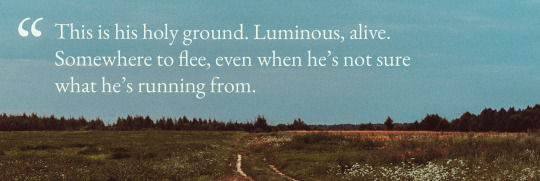
He needs to eat something. There’s raw celery in the vegetable crisper. A new pack of whole wheat tortillas atop the toaster. It’s when he’s pulling them out to eat, the low static hum of a radio station left on gritting midair, that he realizes perhaps that’s exactly it—he can’t tell Eliza about the church. Not because she won’t care, but precisely because she will. She’d follow him every time he goes, ask what he was thinking of every time he bowed his head to pray. He doesn’t know what he thinks. Most of the time he isn’t thinking at all. But what he knows for certain is the church and his meandering walk, that couple in the café, the fact that one always leaves, are not just routine for him. This is his holy ground. Luminous, alive. Somewhere to flee, even when he’s not sure what he’s running from.
And that's it! I'm really excited to introduce y'all more officially to Hallowed Bodies! :) And because I vowed to make these updates feel more cozy, here's this Lonancore gif LOL:

#writing#writeblr#writerblr#amwriting#writing update#writingupdates#mothwork#hallowed bodies#everyone say hiiiii lonan :3333#he's everything to me <33333
30 notes
·
View notes
Text
Living Pictures | BODY BACK Update #1
A writing update??? In THIS economy???
Paying homage to my old writing updates, except we're getting 10x more self-indulgent. Let's talk about falling back in love with characters, orbital chapter structures, Harrison's messy redemption, God as memory, and of course, the first chapter of my novella, BODY BACK. With lots of excerpts of course. 😈
Post starts under the cut!

BODY BACK background:
Here's a summary if you missed the chaotic conception of BODY BACK: it's a literary fiction novella that occurs between a duology I wrote a few years ago (book 1 is Moth Work and book 2 is Feeding Habits). The duology follows two men, Lonan and Harrison, who are at the centre of a very complicated relationship.
I talked in depth about this project's conception in THIS post, but the gist is that I re-read Moth Work recently and was so enthralled by Harrison's psychology that I had to extend his story.
This was the first nugget of BB:

[ID: BODY BACK: Harrison's novella in the two months he lived in Las Vegas, 2005 (Oct-Sept, between the events of FH in 2006). Energy: bad decisions, lots of parties, self-destruction but make it glitzy. /end ID]
Logline: It’s 2005 in Las Vegas and 21-year-old Harrison is tired of routines, of gods, of men. On a mission to move past a complicated breakup, he’s about to get recklessly indulgent–and he’s come to the right place.
I'm honestly shocked, but deeply grateful to be writing this project. The last time I wrote a writing update, I'd been deeply struggling with Feeding Habits, and also hated Harrison as a character (shock!). Of course, he was still my baby, but at the time, I just could NOT crack his psychology. It took a full year to really come to terms with where he was in FH, and BB is almost an opportunity to "redo" what I wish I could've given him initially. So BB feels like a redemption for me as much as a redemption for him (albeit... he does zero redeeming in this book lmao).
I think I'm in love... with Harrison
Characterization is complicated for me. I don't think I'm particularly good at it because I have no idea how I characterize. However, BB has been such a wonderful way to fall back in love with Harrison (more than I already admire him as a fictional person in my brain lol). While I've been writing with him becoming a better person in Seventh Virtue, BODY BACK is the opposite of that. He's in his destructive era and knows it. And it's only making me love him more!
In BODY BACK, Harrison is painfully aware of who he is as a person, but simultaneously extremely destabilized in his identity. He understands he's a disaster, but also doesn't know how to be anything else (or what he was before), now that Lonan is no longer in his life. At the end of Moth Work, he willingly walked out of Lonan's life, aware this was what was best for himself. BODY BACK explores what it means to regret the "right" decision. Grey areas, wooohooo!
A smaller note that maybe only means a lot to me, but Harrison & I are the same age in this book! I've never been the same age as one of my protagonists, and maybe I'm being mushy about it, but I feel like I really... get where he is right now. We've always been similar (except he's you know... much cooler than me), but it feels like a real blessing to see him in this state (lmao *fucked up*) while also this age.
Living Pictures
We open BB with "Living Pictures," which is about Harrison perceiving his life as separate from himself, a carefully constructed veneer that he's merely watching.
Thematically, "Living Pictures" is about falsities and also how easily people can fall into--and be trapped by--roles. Harrison also thinks a lot about gods, which is interesting for his psychology because he's an atheist. However, his contemplations of God are deeply rooted in what God means to Lonan, who's an ex-Catholic. I've had a lot of fun exploring these themes also as an ex-Catholic. It's been quite cathartic to recall my memories of God, project them onto Harrison through Lonan, and then have him bastardize them.
The title comes from the literal translation of the phrase "tableau vivant" which appears in the opening paragraph.
Scene A:
Harrison floats fully-clothed in a pool that belongs to a wealthy couple. He is jaded and also thinking about God.
Scene B:
Harrison describes the couple who own the house/pool. The man is a realtor, and the woman stays at home mostly, but walks dogs on the side.
Scene C:
Harrison contemplates his "easy" Las Vegas life since moving in with his mother, Suzanna.
Scene D:
Flashback: Harrison recalls drawing his new sort-of boyfriend, Jeremiah.
Scene E:
Harrison describes his vices (smoking and his ex, Lonan lmao, comparable)
Scene F:
Harrison recalls a recurring dream/nightmare of his aforementioned ex.
Scene G:
Distracted by the dream, Harrison is caught by the couple. The man seems unimpressed by him, though the woman (Sadie), perhaps realizing how young he is, invites him inside for tea.
Scene H:
Harrison observes the couple's "catalogue" home while Sadie makes tea.
The writing process & orbital structures
This first chapter took about two weeks to draft start to finish. Total word count is at about 3k. The scenes are very short, almost like vignettes!
Across MW and FH and BB, I use what I call an "orbital plot structure." I've been using this method for years now for this particular duology.
Essentially, we have a core theme (the "satellite") that every single scene "orbits" around. Here's a horrific drawing of what that visually looks like in my head:
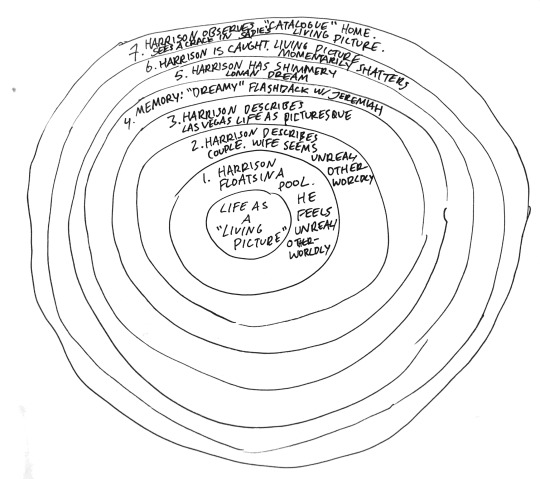
Instead of thinking as these chapters as a three-act structure, I think about them on a deeply thematic level. What is the core of this chapter, and how does every single scene lead back to that core theme?
If this diagram is unreadable, dw, I'll make a video explaining this soon, LOL.
Excerpts
I've shared a number of these, but enjoy this repeated content! Also this is... most of the chapter LOL. I'm going for this extremely shimmery prose style to mimic Harrison's mindset.
Here's the opening scene, which is... the best opening I have ever written LMAO. CW: blasphemy??? So sorry.
Harrison doesn’t need a god. Fully clothed in a stranger’s pool, he pities people who do. So what if he’s alone? The sunless sky is carbonated with stars, another stranger’s backyard smelling like burned cedarwood and marijuana. And he likes it here, star-fished on water that doesn’t belong to him, inventing constellations while someone else’s cigarette hangs from his lip. What god could manage this miracle? Take this drowsy tableau vivant: a man cloaked both by the sky’s navy and his own jacket’s leather, his eyes as wide as spoons. Harrison is fine art and God isn’t. He wins.
Here's a chunk of Scene B:
This isn’t the first time he’s done this. This means a couple of things: 1) challenging God and all his righteousness, and 2) breaking into the pools of wealthy suburbanites. The latter really isn’t that hard. Since mid-September, he’s stalked the houses plotted along Paradise and learned routines. This is even easier—people who fringe their homes with crisp lawns often stick to the same schedule. The pool he floats in belongs to a young couple. The man works real estate according to the signs Harrison’s seen of his face peppered around the neighbourhood. He’s wondered if that’s ever humiliating, to constantly see pixelated versions of yourself everywhere. But that doesn’t matter. His wife walks dogs in her free time, which means always. Last week, Harrison watched her jog with a vizsla, and just yesterday she spent the morning on their gable-roofed veranda brushing a wispy Alaskan malamute.
Here's the entirety of Scene C (CW: suicidal ideation):
Technically, everything in Harrison’s life is easy. He lives in an easy apartment, sleeps on his mother’s easy chesterfield, eats over easy eggs for breakfast, watches easy infomercials every night from midnight to 3:00AM. (Technically, the infomercials aren’t necessarily easy because he watches them in French without subtitles, but it’s entertaining to make up slogans: Cut Away Your Problems with Our Wrapping Paper Cutter! Yeehaw!, so he doesn’t really mind.) And he’s grateful for this, how unassuming his life has become barely a month after Lonan. Perhaps this is how he views things, in two simple parts—not Before Christ, but Before Lonan, which now that he considers it, might be the same thing. Anyway. Before his fawny portrait face, just like Renaissance men in oil on canvas. Before his blunt hands. Before his raven hair, glassy as dark water. Now there’s only one place left to go: after. And how can Harrison complain? His easy mother has insured his easy sedan which means he could get around the city easily if he wanted to. She’s even offered to use her easy money to set him up in his own easy apartment— “Imagine the view!” she’d said as a selling point. And Harrison did. As Suzanna unclogged the kitchen drain, he painted an easy coastline in watercolour and surrendered to the image of his easy, independent life. Easy trees like the date palms pinched against this couple’s home. Easy skies, never a cloud in an easy haven of blue. Easy walk to an organic farmer’s market for easy pancetta if he wants it, or easy cinnamon butter that he has no purpose for, so eats straight from the jar. Easy morning coffee in an easy alternative garden right out his back door, easy sand where there should be golden columbine, easy gravel where there should be soil. And the easy neighbours to greet—them going, “Hello!” and then him going, “Hello!”
Harrison doesn’t like easy. He’d rather walk all the way back to Brooklyn with nothing but an empty backpack and a sleeve of cigarettes, scale a silverish high-rise with his bare hands, struggle onto the vacant roof, stare out at the blinking, vulgar city, then climb onto the building’s railings, let the wind ripple his jacket, his hair, and jump right off.
Here's some of Scene D, ft. Jeremiah:
The cigarettes belong to another man. As Harrison sucks its filter, blowing out remaining plumes of smoke, he’s enthralled by him. Skin velveteen, hair always tediously puffed like dandelions. Jeremiah is more than a man in Harrison’s eyes, the way he speaks like a cross between the frontman of a nineties alternative band and John the Baptist. “You’ve got the soul of a cypress,” he said once, while Harrison sketched the fake rhododendron perched on Jeremiah’s nightstand. He crouched lower over his sketchbook, fingers blackened by a slim rod of charcoal.
This is also from Scene D, ft. Harrison being an Artiste. Screaming at the last line:
Jeremiah quirked a brow, his smile dopey like his glazed eyes, but didn’t move. He could’ve been one of those tawny art mannequins, flat-faced, poseable. But he was so much more than that. As Harrison approached him, setting his sooty hands on his chin, shifting it slightly to the left, pushing his ring finger slightly up so it eclipsed the koi’s eye, his silver signet ring pinging a circle of light onto the opposite wall, Harrison understood Jeremiah wasn’t just a model. More than a man, yes, but not a god either—the creator’s creator, maybe, or perhaps a private natural wonder meant only for this room. Or maybe he was just beautiful, and that was enough too.
Harrison continues to reflect about God (also CW: blasphemy!!!):
In the pool, he doesn’t look at the moon because how cliché would that be? So what if it’s a wide bend in the sky like the parenthesis of cantaloupe his mother ate for breakfast this morning? So what if it looks also like a good bite in a wrist, molars and all? He’s not in this pool to be poetic. He doesn’t care about godly creations, miracles, divine epiphanies. Sure, God said let there be light, but why should Harrison give a fuck? He’s not a romantic. He’s not a dreamer. Not anymore.
This is the entirety of Scene F, which is a direct continuation from the above. I love how the "dreaming" element is immediately brought over.
There’s this one dream though. It hovers over him nightly, a thorny memory warmed by sun. He holds a face like a sculptor holds a brick of clay. This is a face he knows. A face he loves. Soft light dredges both their jaws, firm and ready to rear into the other’s, two animals feeding, or laughing, or breathing. Sometimes, the dreams add birdsong, sometimes a black cat named Beatrice who mews in the corner. Sometimes, the face’s hands become Harrison’s hands, and he searches for his own pinkie to find someone else’s. They don’t need to touch more than this. Even as the sun hazes the room gold, looking is more than enough. Are there mirrors in his eyes? Harrison isn’t always certain. Is he a mirage? He could be—a chromized distant object. He’s a masterpiece in some moments, a man growing into soapstone, buffed marble. Sometimes he’s haloed like Jesus in citrine stained-glass portraits. A saviour, mid-ascension, a shadow of flesh. But sometimes he’s just there, wide-eyed, a simple body. In those cases, Harrison wakes up screaming.
This is from the beginning of Scene G:
Sure, he is a floaty man in this pool, his clothes bloomed around him. He could be petals of blood dispersing in open water, or the unspooling ribbon on a Maypole. His cigarette has burned down nearly to his knuckle, smoke chalk white and feathery like cirrus clouds.
Just going to leave this extremely Lonancore excerpt here:
And then a voice. At first he thinks it might be Lonan’s. One of the last things he’d said: How long will you be gone? Gone. How easily Harrison had stood in that apartment, aware of what he’d do just like he was aware of the mouth Lonan had touched the night before, the palms Lonan had imprinted with his own like Eucharist imprints a tongue before being swallowed.
(????? bruh ???)
This paragraph continues the previous:
And then he’s gasping on water, and there’s the voice again, and it’s not a friable whisper but a shout. “Who the hell are you?” it’s saying over and over again, a godless prayer, except scratch that—when God speaks, he does it with violence.
And the end of Scene G:
Harrison is dragged out of the water by the realtor like he’s a plastic bobber attached to the end of a hook. His cigarette butt smolders in his hand, curlicues of white trimming the tarry night. On the concrete pool deck, he coughs water, the world spitting around him like a skipping VHS. His soaked hair drips into his eyes, down his mouth, half his weight bent on his wrist, his waterlogged jacket heavy like a body on his shoulders.
The man’s got a bony hand hooked around his collar and hides his struggle to let go with more shouting, something about grabbing a home phone, about police, about changing the locks. Really, Harrison should care more, but he’s focused on the man’s drawn face. He looks different than he does in his signs around the neighbourhood, his thin mouth clefted, his hair mousy without its Dippity Do shell. Did his wife fall in love with him, or the glossy image in the ads?
The man is trying to yank him up by the arm, manages to get halfway before Harrison says, “You’re the guy in the ads,” his voice hoarse as he wipes a hand over his slack mouth. And this must be surprising to him because the man immediately loses his grip. Harrison could ask him about that—why expect not to be noticed if your face is everywhere?
“What did you say?” asks the man. What’s his name? Something generic, but with an edge. Trevor Slade. Sean Horton. Brody Spencer. A gingery light pulses behind his head—a lamppost from the street. Harrison pants like one of the woman’s dogs. If he were a dog breed, which one would he be? Mastiff, German shepherd, golden retriever? He’s about to ask when the woman speaks first.
She’s got that same rainy look in her eye from before, a pointed pity that’s soft at the edges like highlight bloom. “Do you want to come inside for some tea?”
In Scene F, Harrison dangerously flirts with the idea of being punched in the face:
“I like your place,” Harrison says, pinching the ceramic kitten that sits on the coffee table. This isn’t a lie unlike everything else he’s told them—his name is Harold Fraser, and the number Sadie dialed into their home phone is his personal assistant’s, not his mother’s. In here, the walls are tangelo orange, each entryway arched instead of severely right-angled. Suz would like the warm wood, the army of rubbery philodendrons on the windowsills. Harrison cranes his finger up the kitten’s paw, as if shaking its hand. Across its domed belly, translucent letters: JESUS IS STILL THE ANSWER.
“Don’t break that,” says the man, whose name is actually Nash Baker.
Harrison quirks a brow, his mouth twitchy. In five minutes, he’ll need another cigarette. “Family heirloom?”
“Do you take any sugar?” asks Sadie, perhaps at the right time because Nash Baker’s fist is agitating like a fighter fish’s tail through water. Harrison wouldn’t blame him if he did punch him in the face—to be frank, that would be the most interesting thing to happen to him all week.
Harrison relates to Sadie's apparent feelings of being trapped in a picturesque life:
Sadie walks dogs, sure, but what else does she do? A beaded tapestry of a blue heron hangs in the foyer—did she make it? The bird’s eye is onyx black, something unfurling there—maybe the urge to spear a minnow, maybe just deadness. If Sadie didn’t make it, what did she do in this house? Nearly everything is handmade but certainly purchased—the pottered mugs shaped like seasonal fruit that she vigorously plops teabags into, the rust Chobi rug that snags under Harrison’s socks, the ringed vases fluted with dead baby’s breath. How does she know life in this catalogue home? Besides the numbing daily walks with dogs, the repetitive brushings. She’s as fucked as he is, isn’t she? Trapped in this living picture.
And finally, another mildly blasphemous excerpt! We return to the "easy" metaphor from above.
Tomorrow, Harrison will again wake up in Suz’s easy apartment, eat her easy turkey bacon, drink an easy cup of dark roast. He’ll do this for the rest of his life, probably. For Yours is the kingdom, and the power, and the glory, forever and ever, amen. Harrison’s got no kingdom. The best he can do is steal Jeremiah’s cigarettes, float in an aquamarine pool that doesn’t belong to him any more than Lonan’s aquamarine eyes ever belonged to him. He’s got no more power than a dead car battery, no glory. That’s right. Forever and ever and ever and ever and ever and ever and ever amen.
Harrison, basically:
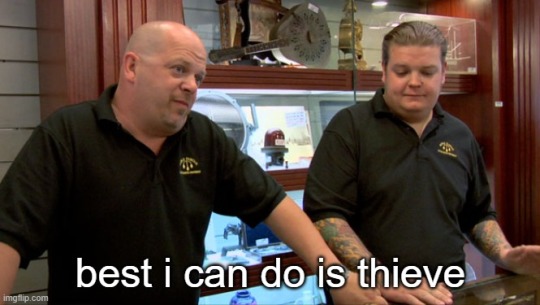
And that's it! Chapter two is going to contain the trigger into destruction territory, so look out for update #2!
Rachel
#writeblr#writerblr#amwriting#writing#writing updates#writingupdates#bodyback#actually writing this was fun LOL#seeing all the writing in one place....... like wow this is amazing#if i leave a writing update with a god complex...#i have won#question for the masses: if u had an opportunity to punch harrison in the face#WOULD YOU#he wants you to say yes <3
47 notes
·
View notes
Text
harrison braindump on main but i'm revising the BB ch. 2 bathroom scene between him and suz for a class and something my prof mentioned to me in office hours has TOTALLY skewed the way I see that scene (in a great way).
they mentioned (more or less) that suz is entering this scene with an understanding that her son is humiliating her, which I think is so fascinating. they had pointed out this image of pool water being tracked alllll through a rich person's house (messing with the hardwood, staining the carpets, etc) and how that's such a... defeating moment for suz as a mother.
this was kind of a brainwave for me because a) I'd never thought of that even though duh (I mean... imagine your disaster 21-year-old child breaks into someone's house and floats in their pool fully-clothed and then is caught by the owners who pity him and call YOU instead of the police) and b) it's such an interesting reveal of a theme I hadn't even considered in BODY BACK--humiliation--and what it means to be humiliated and also humiliate someone else.
this whoooole book is a giant humiliation! for suz, she's totally getting the fact that she's not been a great mother thrown into her face--which is hard for her to accept because she's trying now (the question for her becomes: is it too late?). for harrison, he's experienced soooo much humiliation in his relationship with lonan & of course in his relationship with suz when he was a child, and now he's projecting all of that back onto her.
this scene is such a pain to edit--I didn't even like it when I shared some excerpts in my update--but something about my prof basically saying, 'if she enters it with a sense he’s humiliating her, that’s strong fuel,' revealed something deeply complex about BB to me... what does it mean to experience humiliation when you've been humiliated so many times, and what does it mean to almost carnally desire to humiliate those who've also hurt you?
that question, I think, has driven harrison to where he is now (24-karat territory) where his entire persona atm is quite humiliating (also cool but mostly humiliating lol). he's almost... desperately accepting that humiliation in fear that if he doesn't, it'll make him VERY aware of his vulnerability.
which... this gets even more interesting when we remember that in feeding habits, humiliation is a big theme for LONAN, so much so that harrison even notices it in narrative.
and then also to remember this chapter is ALLL about mary & jesus as much as it is about suz & harrison... and THEN to remember that when young jesus terrifies the living shit out of his mother by staying back in jerusalem, the first thing he says to her when she asks him "why did you do this, you scared me" could be interpreted as humiliating (he basically goes "why were you even worried, didn't you just KNOW I'd be in my father's house??")... like damn HAHA
#anyway it was terrifying to have other people read this#especially because I already: didn't like it#but wow actually editing your writing can make it better when u didn't initially like it???#a CONCEPT#I wish I'd had more opportunities to talk through my work like this#as a pantser it's almost integral sometimes to have people tell YOU what they think your work is...#perhaps it's just me but most of the time??? intention is deeply subconscious#but having this scene explained to me?? i was like... wow I did something LMAO#need to do some more literary analysis on my writing tho actually i'm fantastic??? somehow??? HAHAHAHA#anyway harrison is so interesting i need to poke at him like he's the operation boardgame man
12 notes
·
View notes
Note
I liked your recent snippet of Harrison and Jeremiah. How do you effectively convey such a chaotic character like Harrison? I feel like my range to write emotions can be stilted.
thank you so much! <3 to be honest, I don't feel like I do anything in particular because I just know him very, very well--I've been writing him for nearly 10 years! That doesn't mean it's easy though--his entiiiiiiire Feeding Habits POV section took almost 2 years to write because I SEVERELY misunderstood him (basically I still saw him as the man he was in Moth Work--a well-intentioned caretaker, when HE'S NOT, the events of MW turn him into a jaded, reckless, selfish, angry person, which is how he is in both BB and FH).
Really, I was doing him a disservice because I refused to see how he could change and refused to empathize with the person he'd become. Funnily, I never did that with Lonan--I've seen Lonan change SO much, and that always made sense because a big part of Lonan's psychology is being a bad person who becomes a better person, but it took me way too long to also extend that empathy to Harrison (and see him as a good person who becomes a "bad" person).
Now that I'm aware of where he ACTUALLY is and not where I wanted him to be (which is why his POV chapters were tortureeeee to write, and I had to scrap the original direction of the book), the decisions he makes are quite intuitive. Before extending all this empathy to him, I found it hard to understand WHY he'd do bad things like inviting Reeve (Lonan's sister) to dinner in his first chapter in FH and not because he cares about her, but so he can "use" her to see her brother again (which is one of the worst things he's done IMO LOL). But time has really changed that for me--Harrison does SO MANY bad things, and it's because he's going through a difficult time (sure we can call him a bad person, but at his core too, he's really so deeply hurt that he's making terrible decisions--that good person he was before hasn't actually disappeared, but is veiled).
Anyway, all this is to say that sometimes it's easy to impose our own moral compasses/desires onto our characters. I always saw Harrison as the good guy, and to see him as the opposite? That seemed impossible to me. But that's where voracious empathy came in. I met him halfway, and the rest is really history!
1 note
·
View note